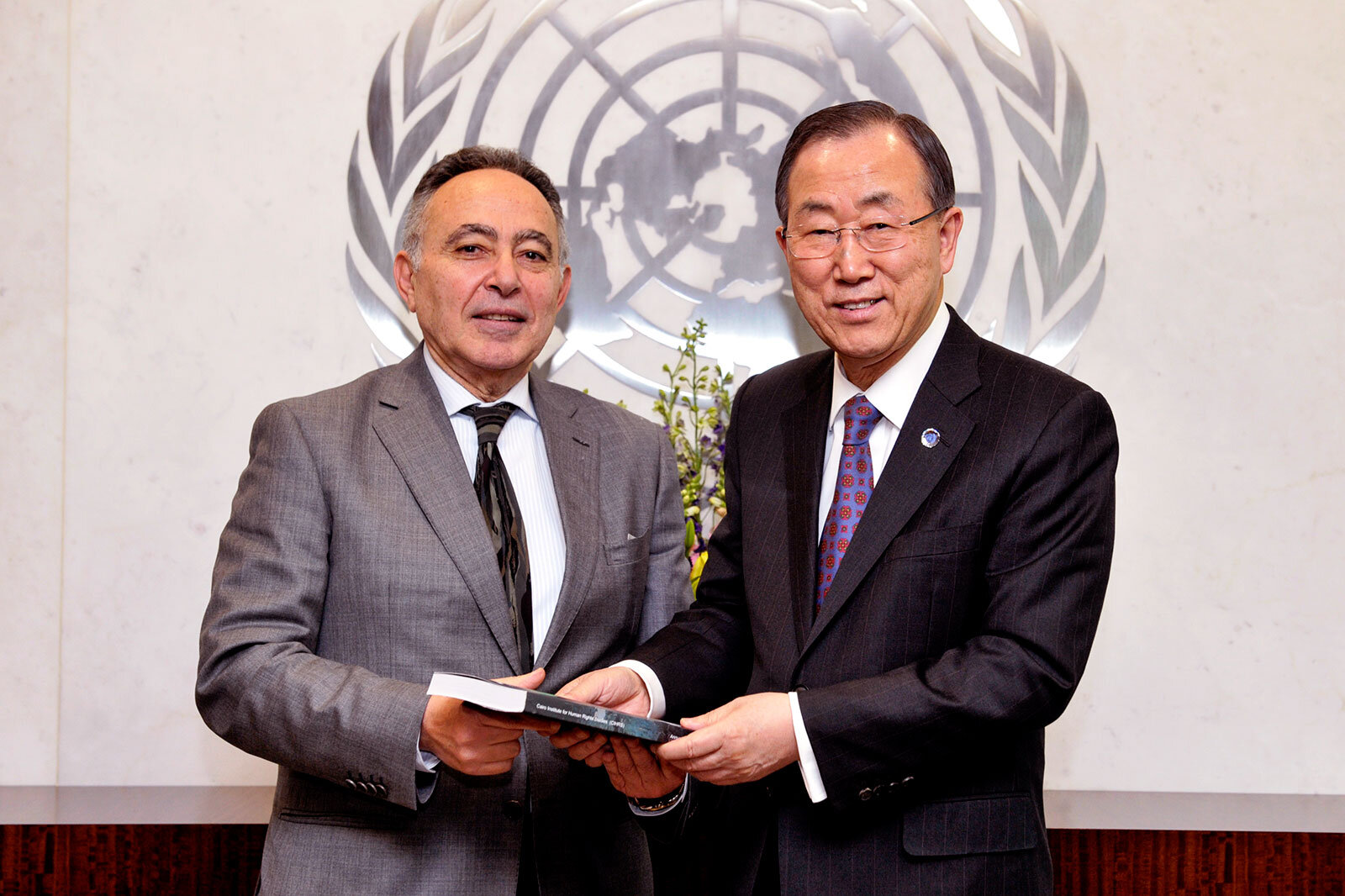Egyptian human rights activist Bahey eldin Hassan, pictured here with former Secretary-General of the United Nations, Ban Ki-Moon (Photo: Mark Garten)
Monique El-Faizy
Hope is not the first word that comes to mind for most when the topic of Egypt comes up these days. Journalists are being thrown in prison for telling the truth, teenage girls for posting videos of themselves dancing on TikTok and witnesses to sexual assault for coming forward. Add in mounting unemployment and a shrinking economy and the picture that emerges is far from rosy.
There are those who have less reason for optimism than others, Bahey eldin Hassan, director and co-founder of the Cairo Institute for Human Rights Studies (CIHRS), among them. This lifelong rights activist has been in the crosshairs of various regimes for most of his adult life, but in 2014 the water in the proverbial lobster pot heated up so precipitously that he was forced to jump out. He has been living in self-exile in France ever since.
Born in Cairo in 1948—the same year the UN Declaration of Human Rights was adopted, he points out—Hassan began his activism young, joining student protests during the Nasser regime in the 1960s. He did a brief stint in prison at the time, which did nothing to hinder his momentum. Hassan became a journalist but his engagement became a career in 1983 when he joined the Press Syndicate’s freedoms committee. Two years later he got involved with the Egyptian Organization for Human Rights (EOHR). The following year he was elected to the board of directors and in 1988 he became the organization’s secretary general. It was under Hassan’s direction that this secular organization started documenting rights abuses against Islamists and issued the first detailed report on torture and began lodging complaints with the United Nations.
In 1993 Hassan expanded his reach, co-founding CIHRS, which defends human rights not only in Egypt but in the Middle East and North Africa as well. Today it is the region’s largest such organization, with representatives in Cairo, Tunis, Geneva and Brussels.
Sisi’s crackdown on Egypt’s protesters has been severe.
Around the time that General Abdel Fattah el-Sisi was elected president in May 2014, Hassan became aware of a threat against him. There was nothing particularly new in that: Hassan had regularly been threatened both by the government and the Islamists throughout his 30-year career as a rights activist. But this time was different. Hassan had criticized the military ouster of president Mohammed Morsi and called it a coup. Many had already been thrown in jail for similar statements. When Hassan told the ambassador to Cairo from a western nation about the warning and from whom it had come, the ambassador took Hassan into a secure room and told him to leave Egypt immediately. The new government was willing to kill, the ambassador told Hassan.
Still, Hassan wasn’t entirely convinced. He left for a previously planned work trip to Geneva and New York, and told UN officials in those cities about the threat. They urged him not to return to Egypt and to have his wife and daughters join him abroad.
“I didn’t believe that it was so serious,” he told me. “That was my internal feeling, but I was wrong. I have been sure for some time now that those diplomats were correct and that I should have left Egypt on the same day or, when I received this advice in New York, I should not have gone back to Egypt.”
But go back he did. After consulting with friends and family there, though, he was persuaded: He, his wife and his two young daughters needed to leave. He set about making all the arrangements he could in a week or so, both for himself and his family, and for his organization and its employees, whom he knew would be in danger once he left. He registered CIHRS in Tunisia and made sure the organization’s leadership would be able to be based there, where they would be safer. That office is now the organization’s regional headquarters.
Then Hassan had to say goodbye—probably forever—to family and friends, many of whom he was not able to tell what he was about to do. He took his family to a beach resort to create the impression of normalcy and to ease a bit of the tension they were all under.
And then, they packed their suitcases and flew to Europe, ostensibly just for a trip. They have been living in France ever since. They’re not in hiding, but they do take precautions and the French authorities know where they are and are aware of their situation.
But even as he was leaving Egypt, Hassan wasn’t completely sure he and his family was in danger. “Later on I realized how serious it really was,” he said.
That’s what a public death threat will do for you. In 2018, an Egyptian television host said that the government should “deal with [Hassan] the same way the Russian spy was dealt with,” referring to the nerve agent attack on Sergei Skripal in the United Kingdom. He was reacting to a memo that CIHRS and six other independent Egyptian human rights group had sent to the UN Secretary General about the dismal state of human rights in Egypt, particularly during the run-up to the presidential election. The host reminded the nameless government officials he was urging to take a hit out on Hassan that they had done it before.
Hassan had reason to believe Egypt’s arms were long enough to reach Europe. A year earlier, two men posing as Egyptian journalists hung around a human rights workshop in Rome and took photos of and otherwise intimidated participants.
Despite all that, Hassan maintains an attitude nearly as bright as the sunshine-yellow polo sweater he wore for our Zoom interview. He laughs easily, even when talking about his darkest days. When I told him I found the story about the TV host calling for his assassination terrifying, he simply said “yes” and started chuckling.
Fear just isn’t something Hassan lets himself indulge in. He can’t, he told me. It would paralyze him. “What can I do?” he asked rhetorically. “This is a government and it has no limits in attacking, killing, whatever, individuals or mass killings.” If he let himself feel the fear, he said, “I would do nothing.”
Instead, he does a lot. Living in France hasn’t slowed Hassan’s advocacy efforts one bit. He has continued to lead campaigns in protest of the anti-democratic conduct of the Egyptian government and to hold regular meetings with senior global leaders, including UN secretary generals Antonio Guterres and Ban Ki-moon and president Barack Obama, whom Hassan pressed to be tougher on Mubarak. When Obama jokingly asked why Hassan was being so tough on him, Hassan replied that if Mubarak would take a meeting with him he would happily level equal criticism.
The Egyptian government, though, doesn’t seem to have the same equanimity as Obama did. In August, Hassan was sentenced in absentia to 15 years in prison for tweeting against torture and the lack of judicial independence in Egypt, and calling for justice for Italian student Giulio Regeni, whose mutilated body was found on the side of a road in January 2016 after he had been abducted. His body showed clear signs of torture, and Egyptian security officials are strongly suspected to have been involved in his death, though the Egyptian government has always denied that.
Hasan’s sentence was the longest ever given to a human right’s defender in Egypt and came in addition to the three years to which he was sentenced in 2019, also in absentia and also for tweeting, that time criticism of Egypt’s public prosecutor.
As long as Sisi is in power, Hassan cannot return to Egypt. And he misses it. He misses the streets of downtown Cairo near his office. He misses tamaya and ful medames and the rituals and the company that were a part of those meals. He watches old Egyptian films that show the lives of ordinary Egyptians on his laptop nearly every day and he gets nostalgic when he sees good pictures of downtown Cairo.
And yet, Hassan says he is hopeful about the future of rights in Egypt. “Of course,” he tells me. “I couldn’t survive without hope.” He looks to the past: He joined the human rights movement when there was such thing in Egypt, and now, fettered though it may be, there is. The current situation, he believes, is unsustainable, given the trouble economic situation in the region. “At the end of the day, Sisi and his military have to feed his [population of] 100 million and he has almost exhausted his resources,” Hassan said. Survival will require a radical shift, Hassan believes, primarily economic, but that will have a knock-on effect.
It is that conviction that keeps Hassan going. “Of course I am hopeful for the future,” he says. “Otherwise I would not continue in my work.”
Monique El-Faizy, a TMR contributing editor, is a journalist and author based in Paris.



